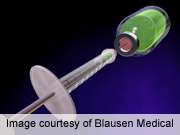(HealthDay)—Children who receive the first dose of a two-dose schedule of measles vaccine at 12 to 13 months compared with 15 months or later have a greater risk of developing measles, according to a study published online Oct. 21 in Pediatrics.
Fannie Defay, from the Centre Hospitalier Universitaire de Québec in Québec City, and colleagues compared measles risk among two-dose recipients of the measles-mumps-rubella vaccine (5 to 17 years old), where 102 children had measles and 510 matched children did not have measles.
The researchers found that 89 percent of measles cases occurred in children 13 to 17 years old. Receiving the first vaccine dose at 12 to 13 months of age compared with ≥15 months of age was associated with an increased risk of measles in children outside the outbreak school (odds ratio, 6.2) and the pool of children inside and outside the outbreak school (odds ratio, 5.2).
"A significantly greater risk of measles among two-dose recipients whose first dose was given at 12 to 13 months rather than ≥15 months of age is confirmed in the larger Quebec data set," Defay and colleagues conclude. "The optimal age at first dose may warrant additional evaluation."
Several authors disclosed financial relationships with pharmaceutical companies.
More information:
Abstract
Full Text (subscription or payment may be required)
Journal information: Pediatrics
Copyright © 2013 HealthDay. All rights reserved.




















